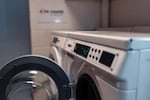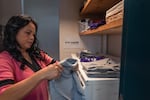
Whirlpool has donated washers and dryers for three elementary schools in the Parkrose School District, part of their Care Counts Laundry Program, started in 2015. The program expansion, which included Oregon, provides an estimated 50,000 students with clean clothes. According to Whirlpool, dirty clothes are a driver of absenteeism in the United States.
Courtesy of Whirlpool
Parkrose School District is installing washers and dryers in three elementary schools to help prevent students from missing class.
Prescott, Sacramento and Russell elementary schools are joining a national initiative led by Whirlpool’s Care Counts Laundry Program in partnership with Teach for America. The program has installed washing and drying machines in schools in underserved communities since 2015, reaching more than 150 schools across 40 states.
Parkrose is the first Oregon district to join.
“It’s bigger than just us,” said André Goodlow, director of teaching and learning for the Parkrose School District. “There are families out there that are in need. And as a school district, sometimes we have to just take the risk on behalf of our families in the community that may be struggling.”
Across the country, chronic absenteeism rates — when students miss 10% or approximately 15 days of school a year — have continued to climb in recent years. The rate has doubled nationally from the 2018-19 school year, impacting an estimated 16 million, or 1 in 3 students nationwide.
Students miss school for several reasons, ranging from weather conditions and illness to anxiety or bullying.
But educators have noticed not having clean clothes is one of the problems.
About 15% of households in the United States don’t have washing machines and rely on laundromats, according to a report distributed by the independent think tank Future Ed and the nonprofit Attendance Works.
Experts with Whirlpool told OPB that students can experience bullying because of dirty or smelly clothes, which pressures them to skip school. Missing school regularly can make it hard to learn fundamental lessons and catch up with their peers.
“If there’s a handful of students that are missing school because they don’t have access to clean clothes, or to laundry [machines],” Goodlow said, “we want to eliminate those barriers.”
Removing barriers
Parkrose is a small district in Northeast Portland, serving about 2,770 students.
According to the latest state data, almost half of Parkrose students were chronically absent last year. That’s higher than the statewide rate of 38%.
Goodlow explained that for children and teens, clothes can majorly impact their self-confidence and perceived status among peers.
“They might see students come in with brand new threads every other day … and they’re constantly wearing the same two outfits throughout the week,” he said. Some students are so focused on this, he said, that it takes away from their ability to learn math, science and reading on a day-to-day basis.
This is made worse by constant reminders on social media of what is and isn’t the status quo, he said, something older generations didn’t have to deal with.
“If we could alleviate one of those barriers for our students, where they could feel more confident and have that stress and that burden lifted off their shoulders, then they can really focus on learning,” Goodlow said.

Across the country, chronic absenteeism rates — when students miss 10% or approximately 15 days of school a year — have continued to climb. Experts with Whirlpool told OPB that students can experience bullying because of dirty or smelly clothes, which pressures them to skip school.
Courtesy of Whirlpool
The new laundry program was picked for Prescott, Sacramento and Russell elementary schools, in part because they had staff members who were passionate about bringing the project to fruition.
Sacramento has also seen a recent spike in student enrollment, bucking declining statewide trends. And with that increase came an increase in student needs and socio-economic disparities.
Similarly, Goodlow said, Russel is the district’s largest elementary school and has needed more resources for a long time.
Goodlow said he knows the Whirlpool partnership won’t solve absenteeism, but it’s “a little piece” of what they can offer the community.
Building a ‘school-going culture’
The Whirpool partnership isn’t Parkrose’s first attempt to address community needs.
Parkrose has three school-based food pantries, a clothing pantry, holiday drives and an annual shoe drive that brings in upwards of 2,000 pairs of shoes per year. Individual teachers chip in, too, often at their own expense.
Goodlow has seen teachers keep totes of snacks in the back of their classrooms to help feed students between meals. They’ve taken students’ clothes home to help when they couldn’t access washers and dryers. Sometimes, teachers provide families with gift cards or donated clothes.
“We found that helps with attendance,” he said, “but that also helps build that community and school-going culture, where families feel safe and feel seen.”
The laundry machines will allow them to expand those resources.
The district’s grant comes with $10,000 in start-up money for each site. Whirlpool also provides maintenance and washing supplies, such as detergent, for the first year.
Whirlpool’s internal data shows that “high-risk” elementary school students who’ve participated in the program in the past, on average, attended school 16 more days throughout the year. Parkrose will also collect data in their first year to see how the program impacts local families.
Goodlow said the machines for the first three pilot schools were delivered over Thanksgiving break. The schools are now retrofitting their facilities before opening them to students and their families in early February.
Each facility will be unique to the school’s available space and staffing. Prescott Elementary, for example, is using an empty room to create an entire resource center. They will have a kitchen in addition to the laundry machines, as well as computers people can use if they want to apply for jobs, pay bills or just surf the web.
The goal is to expand the laundry program in Parkrose in the coming months to the district’s last elementary school, as well as the middle school and high school.
In the meantime, Parkrose aims to have at least 20-25% of their families accessing the first three locations. Goodlow said they will promote it more in the fall, aiming to increase the use to 50% of district families.
Other districts in Oregon have their own laundry initiatives. For example, Salem-Keizer Public Schools is a recipient of the state’s Tribal Attendance Promising Practices (TAPP) grant, which focuses on the root causes of chronic absenteeism for Native and Indigenous students.
With their funds, officials with the Oregon Department of Education explained, Salem-Keizer installed washers and dryers at two of the district’s TAPP sites: Waldo Middle School and Scott Elementary.
These programs each have a clear goal — to help students stay in school.
“We just want kids to be in a safe environment,” Goodlow said. “The more we can display to them that school is a place that goes beyond just the four classroom walls. It goes beyond learning … It’s one community, lifting up all the individuals that are living with each other.”
